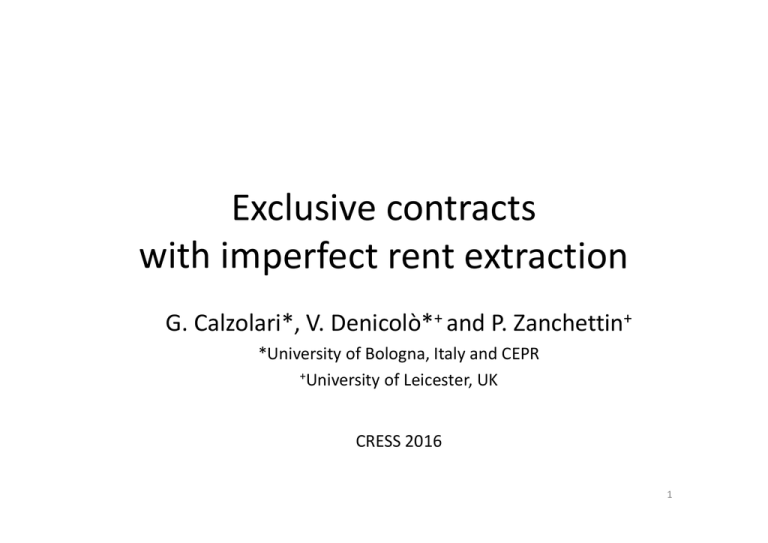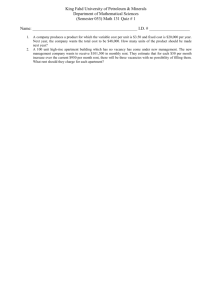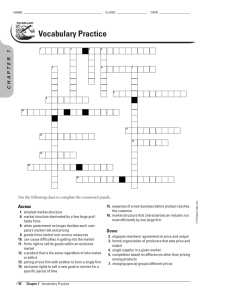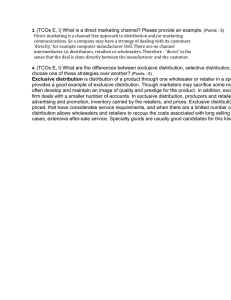Exclusive contracts Exclusive contracts with imperfect rent
advertisement

Exclusive contracts Exclusive contracts with imperfect rent extraction p + and P. Zanchettin+ G. Calzolari*, V. Denicolò* , *University of Bologna, Italy and CEPR +University of Leicester, UK CRESS 2016 1 Exclusivity discounts Exclusivity discounts • Exclusivity discounts: granted only if buyer does not purchase from rivals • Competition policy particularly harsh with exclusive contracts, in C titi li ti l l h h ith l i t t i general very controversial issue – Many Many competing theories with different, sometimes opposite, policy competing theories with different sometimes opposite policy implications – Limited empirical analyses – Difficult to translate theoretical findings into simple criteria practically applicable by antitrust authorities and the courts 2 A simple natural seller’ss trade off A simple natural seller trade off • The benefit of exclusive dealing is that it increases the demand (“volume”) of a seller’s product – Products are (imperfect) substitute Products are (imperfect) substitute • The cost is that in order to induce the buyer to accept an exclusive dealing arrangement a price reduction may be exclusive dealing arrangement, a price reduction may be needed to compensate the buyer for the loss in variety • Core of the analysis is this price‐volume tradeoff – Simple but hasn’t been investigated in general • Note, the benefit only materializes if p>c’ (sellers wants to sell more) 3 This paper This paper • A “general” theory : The profitability and the effects of exclusive dealing depend to a large extent only on the fact that extracting the buyer’ss rent is imperfect so that price‐cost margins are the buyer rent is imperfect so that price cost margins are positive The exact reason why rent extraction is imperfect is less relevant • The exact reason why rent extraction is imperfect is less relevant – Mathewson and Winter AER 1987 (restrict to linear prices) – Bernheim and Whinston JPE 1998 (Sect. V, moral hazard) – Calzolari and Denicolò AER 2013, AER 2015 (sellers with incomplete information) E Examples of a general theory, as we show in this paper l f l th h i thi 4 Model • A A “dominant” seller that produces a product of better quality or “d i ” ll h d d fb li at lower cost, than the rival seller [competitive fringe] – Competitive advantage Competitive advantage • The two products are differentiated for the buyer (likes variety) • We assume sellers can only offer two‐part tariffs Pi=piqi+Fi • Timing – – – – Sellers simultaneously offer contracts Sellers simultaneously offer contracts Buyer chooses which contract(s) to sign [Uncertainty realizes] Buyer purchases and payoffs realize • Compare two scenarios – When When Exclusive contracts Exclusive contracts prohibited – When Exclusive contracts ll d allowed 5 Extracting the buyer’ss rent is imperfect Extracting the buyer rent is imperfect • Reduced Reduced form model: using the fixed fee to extract rent is form model: using the fixed fee to extract rent is costly, i.e. each € seller i obtains with the Fi costs 1+λ (>1) to the buyer (shock irrelevant here) – Agnostic about why, but several possibilities • Piecewise‐linear model with uncertainty: similar to risk‐ aversion but the cost of uncertainty emerges only when losses accrue (“Loss accrue ( Loss aversion aversion”)) – Similar to Bernheim and Whinston (1998, Sect. V, moral hazard), we gain full characterization full characterization • Difference: with “Loss aversion” the cost of rent extraction is endogenous, with reduced form not. However, very similar d ith d d f t H i il results 6 Results 1. As soon as marginal prices are distorted above marginal costs (even slightly, i.e. as soon as λ>0,) exclusive dealing is profitable for some levels of the dominant firm’ss competitive profitable for some levels of the dominant firm competitive advantage • Hence, the result that exclusive dealing cannot be directly profitable (“Neutrality”, Berhneim p ( y, and Whinston 1988) is on a ) thin line: – It holds when the buyer’s rent can be extracted without crea ng any distortion, i.e. only when rent extraction is perfect 7 Results 2. Competitive effects of exclusive contracts follow a simple, general 2 C ii ff f l i f ll i l l pattern: ‐ Anti‐competitive Anti competitive when the dominant firm when the dominant firm'ss competitive advantage is large competitive advantage is large Intuition: Dominant can impose exclusivity without reducing the price too much (the cost of exclusivity) ‐ Pro‐competitive Pro competitive (or neutral) when competitive advantage is small (or neutral) when competitive advantage is small Intuition: a sellers’ Prisoners dilemma, unilateral incentive to offer exclusivity, but then competition intensifies because all prices (Exclusive and Non Exclusive prices) are largely reduced (the cost of exclusivity) and Non‐Exclusive prices) are largely reduced (the cost of exclusivity) • These These pro and anti pro and anti‐competitive competitive effects appear as soon as effects appear as soon as marginal prices are distorted upwards, and irrespective of the exact reason why they are 8 General patter: for any l>0 General patter: for any l>0 Dominant’s firm f competitive advantage Independent products Perfect substitutes Products substitutability 9 General patter: for any l>0 General patter: for any l>0 Dominant’s firm f competitive advantage Exclusivity in equilibrium: anticompetitive Neutrality Independent products Pro competitive: Non Pro-competitive: Non-E E prices lowered by the possibility to offer E, a Prisoners’ dilemma Perfect substitutes Products substitutability 10 Policy implications Policy implications • What we like of this theory: its Robustness – Many details of specific cases may be irrelevant for an trust analysis – The only condition for the applicability of our theory is simply th t th d i that the dominant firm's price‐cost margin is positive (and t fi ' i t i i iti ( d large enough to make the effects that we uncover sizeable) – If this condition is met (p‐c If this condition is met (p c’>0) >0), then antitrust authorities and then antitrust authorities and the courts can focus on the size of the dominant firm’s competitive advantage p g 11 Thank you! “Exclusive contracts with imperfect rent extraction” G. Calzolari*, V. Denicolò*+ and P. Zanchettin+ *University of Bologna, Italy and CEPR +University of Leicester, UK CRESS 2016




